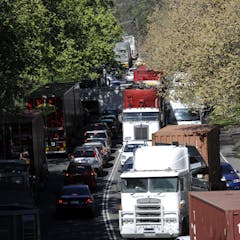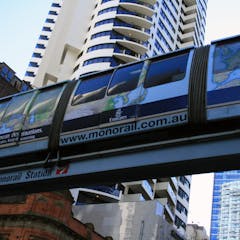
Articles on Transport emissions
Displaying 81 - 94 of 94 articles

Diesel engines have been demonised for their emissions but the technology has already cleaned up its act.

A project set up north of Melbourne’s CBD aims to create a living laboratory for developing a highly integrated, smart, multimodal transport system.

Infrastructure Australia’s latest report is substantial but, critically, it fails to incorporate the transport thinking needed to develop more compact cities that work better for everyone.
There are hundreds and hundreds of side events across the two weeks of the UN climate conference here in Paris. It’s often hard to choose between them. Choosing to attend the International Civil Aviation…

It sounds like something from the pages of books from the 1960s looking to the future: electric cars powered by current drawn from electrified rails beneath the road. However possible such ideas seemed…

Australians love to travel. About 9 million Australians travelled overseas last year, 60% of them on holiday. For most tourists, sustainable development and climate change were probably not high on their…

The Airports Commission has finally rejected Boris Johnson’s proposal for a new international hub in the Thames estuary, reinforcing the expectation that Heathrow and possibly Gatwick will be given the…

Australia has scored poorly in the energy efficiency of its land transport, and is well behind other major economies, a recent international scorecard has revealed. That means Australians are using more…

Transportation continues to generate a large proportion of emissions worldwide, even as emissions from other areas of the economy fall. In the EU, transport accounts for around 30% of CO2 emissions, and…

Footage of Google’s prototype driverless car has got people talking about the potential for self-driving vehicles. While this seems like an exciting new technological advance, in fact the idea is not so…

How did you get to where you need to be today? Car, bike, public transport, or perhaps walking? Transport is one of the biggest sources of greenhouse gas emissions, globally and in Australia. The latest…

Although aviation emissions contribute only 3-5% of the total impact on the planet’s climate, this is steadily growing and is a surprisingly intractable problem to solve. As prosperity around the world…

The announcement came at New Year that David Cameron’s cabinet members might be about to trade in their limousines for electric vehicles. Such a move would make the UK government the world’s first to run…

In last week’s election, the respective contenders to lead the nation offered contrasting views on the transport future. One opted to promote urban roads and the other, urban passenger rail. We chose roads…
